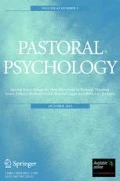In Men and Their Religion: Honor, Hope, and Humor (2002), I proposed that men have two primary ways of being religious—the religion of honor and the religion of hope. I also proposed that because these two religions do not always have their desired outcomes, men have developed a third way of being religious, the religion of humor. In A Time To Laugh (2005) I have expanded on my claim in Men and Their Religion that if men have three religions—honor, hope, and humor—the greatest of these is humor. In the course of doing the necessary research for a book on humor, I acquired and read a few books and a host of articles that explored the psychological benefits of humor. While I did not report on these studies in the book, I believe they are relevant to the assumption that a religion will have psychological benefits for those who embrace it. This article therefore provides a review of empirical studies of the psychological benefits of humor in order to answer the question whether a religion of humor is likely to have psychological benefits and, if so, what these might be.
Similar content being viewed by others
REFERENCES
Abel, M. (1998). Interaction of humor and gender in moderating relationships between stress and outcomes. The Journal of Psychology, 132 267–276.
Beck, A. T., & Emery, G. (1985). Anxiety disorders and phobias: A cognitive perspective. New York: Basic Books.
Bizi, S., Keinan, G., & Beit-Hallahmi, B. (1988). Humor and coping with stress: A test under real-life conditions. Personality and Individual Differences, 9 951–956.
Capps, D. (2002). Men and their religion: Honor, hope, and humor. Harrisburg, PA: Trinity Press International.
Capps, D. (2005). A time to laugh: The religion of humor. New York: Continuum Press.
Deaner, S. L., & McConatha, J. T. (1993). The relation of humor to depression and personality. Psychological Reports, 72, 755–763.
Freud, S. (1963). Humor. In S. Freud, Character and culture. P. Rieff (Ed.), New York: Collier Books. (Original work published 1927).
Gelkopf, M., Kreitler, S., & Sigal, M. (1993). Laughter in a psychiatric ward: Somatic, emotional, social, and clinical influences on schizophrenic patients. The Journal of Nervous and Mental Disease, 181, 283–289.
Kelly, W. E. (2002). An investigation of worry and sense of humor. The Journal of Psychology, 136 657–666.
Lefcourt, H. M., & Martin, R. A. (1986). Humor and life stress: Antidote to adversity. New York: Springer-Verlag.
Nezu, A. M., Nezu, C. M., & Blissett, S. E. (1988). Sense of humor as a moderator of the relation between stressful events and psychological distress: A perspective analysis. Journal of Personality and Social Psychology, 54, 520–525.
Norem, J. K. (2001). The positive power of negative thinking. New York: Basic Books.
Porterfield, A. L. (1987). Does sense of humor moderate the impact of life stress on psychological and physical well-being? Journal of Research in Personality, 21, 307–317.
Smith, R. E., Ascough, J. C., Ettinger, R. F., & Nelson, D. A. (1971). Humor, anxiety, and task performance. Journal of Personality and Social Psychology, 19, 243–246.
Stangland, R. (1979). Norwegian home companion. New York: Barnes & Noble Books.
Thorson, J. A., & Powell, F. C. (1993). Relationships of death anxiety and sense of humor. Psychological Reports, 72, 1364–1366.
Tomic, W., Tomic, D. M., & Evers, W. J. G. (2004). A question of burnout among Reformed Church ministers in the Netherlands. Mental Health, Religion and Culture, 7, 225–247.
Yovetich, N. A., Dale, J. A., & Hudak, M. A. (1990). Benefits of humor in reduction of threat-induced anxiety. Psychological Reports, 66, 51–58.
Author information
Authors and Affiliations
Corresponding author
Rights and permissions
About this article
Cite this article
Capps, D. The Psychological Benefits of Humor. Pastoral Psychol 54, 393–411 (2006). https://doi.org/10.1007/s11089-005-0007-9
Published:
Issue Date:
DOI: https://doi.org/10.1007/s11089-005-0007-9


